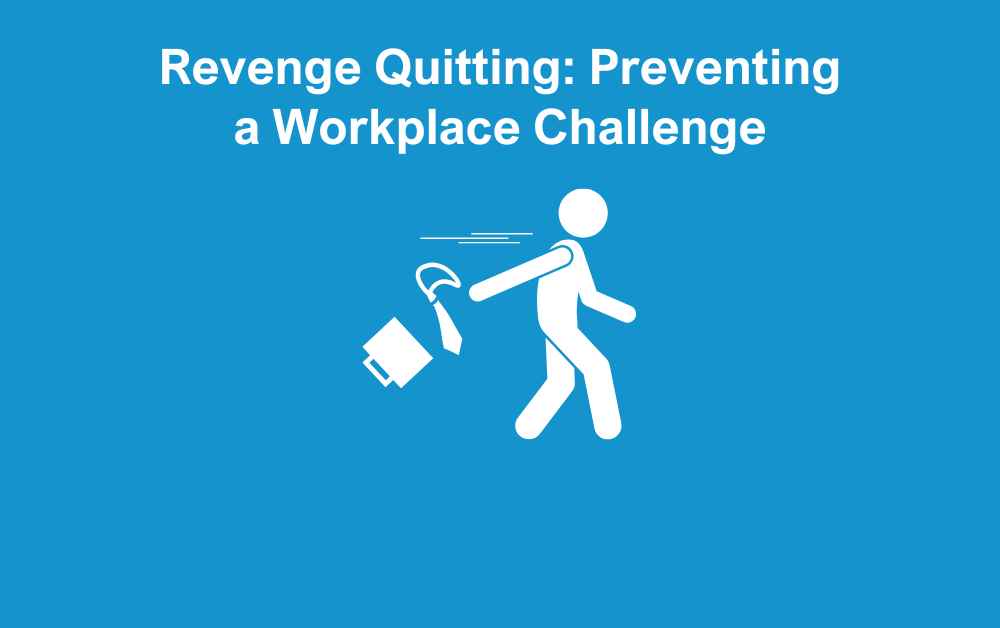Revenge quitting is becoming a growing concern for organisations as workplace dynamics evolve. This was confirmed by a recent Glassdoor survey that found that “wave of revenge quitting is on the horizon”. This phenomenon occurs when an employee resigns abruptly, often as an act of retaliation against perceived unfair treatment, lack of recognition, or unresolved grievances. Revenge quitting can disrupt productivity, damage team morale, and tarnish an organisation’s reputation.
In this blog, we will explore what steps employers should take when faced with this, and how organisations can proactively prevent it.
What is Revenge Quitting?
This is when an employee leaves their jobs suddenly due to frustration or resentment, often without notice. These employees feel that their voices have been ignored or that their work environment has become intolerable. It is a reactionary decision, driven by unresolved workplace issues such as:
- Poor management practices
- Lack of career growth or recognition
- Burnout
- Disrespectful or toxic workplace cultures
- Unfair workload distribution or favouritism
This trend is especially prominent in industries with high employee turnover and competitive job markets. Employers must understand the root causes of revenge quitting to address and mitigate its impact.
The Impact of Revenge Quitting
Revenge quitting can have far-reaching consequences for organisations. Beyond the immediate disruption of losing a team member, this often creates a ripple effect that can harm organisational culture, strain operational efficiency, and even affect the bottom line. Main consequences can include:
- Financial loss – An employee abruptly leaving the workplace can lead to increased costs. Not only will businesses have to invest more in to recruitment to find someone to step in to the roll, they will also need to invest time and money in to onboarding and training.
- Productivity – This can disrupt the workplace in a big way which can drive down productivity.
- The loss of a valuable team member – You could potentially be losing a knowledgable team member who had a deep understanding of the business. This can be hard to replace.
- Culture – Revenge quitting can have a negative impact on company culture as it can lead to a decrease in trust and morale. If other employees are feeling the same way, it may push them to take the same leap.
- Reputational Damage – This can damage a business’s reputation by creating negative perceptions among current employees, potential hires, and even clients, especially if the departure is publicised or shared on social media.
What Employers Should Do When Faced With Revenge Quitting
An employee leaving abruptly can leave managers scrambling to fill positions while dealing with its ripple effects. Here are some key steps employers should take:
1. Stay Professional and Avoid Retaliation
Respond to the resignation calmly and maintain professionalism. Even if the departure feels unjust, retaliation could worsen the situation and harm the organisation’s reputation.
2. Understand the Reasons Behind the Resignation
Conduct an honest and open exit interview. Encourage the departing employee to share their reasons for leaving. Their feedback can provide valuable insights into workplace issues that need addressing.
3. Support the Team During the Transition
Revenge quitting can cause uncertainty for remaining employees. Communicate transparently with the team about next steps and show appreciation for their efforts during the transition.
4. Document and Analyse Patterns
If this becomes a recurring issue, it’s crucial to identify patterns. This analysis can help uncover systemic problems within the organisation.
5. Rebuild Trust
Take immediate steps to rebuild trust with remaining employees by addressing workplace concerns and reinforcing a positive culture.
How to Prevent Revenge Quitting in Your Organisation
Preventing abrupt departures requires a proactive approach to employee engagement and workplace satisfaction. Here are strategies to create a supportive and productive environment:
1. Foster Open Communication
Establish regular one-on-one meetings and create safe spaces for employees to voice their concerns. An open-door policy encourages employees to share grievances before they escalate to revenge quitting.
2. Invest in Employee Recognition
Regularly acknowledge and reward employees for their hard work. Recognition fosters a sense of value and appreciation, reducing the likelihood of frustration.
3. Offer Career Development Opportunities
Provide management training, mentorship, and clear career paths to show employees that they have a future within your organisation. When employees feel stagnant, they are more likely to leave.
4. Promote Fairness and Transparency
Ensure workloads, promotions, and rewards are distributed fairly. Transparency in decision-making builds trust and discourages feelings of resentment.
5. Address Workplace Conflicts Swiftly
Tackle toxic behaviours and interpersonal conflicts head-on. Implementing clear workplace policies and holding employees accountable helps create a harmonious environment.
6. Conduct Regular Employee Surveys
To avoid revenge quitting in the future, gather feedback through anonymous employee engagement surveys to identify pain points and areas for improvement. Act on these insights to demonstrate your commitment to employee well-being.
The Importance of a Healthy Workplace Culture
A healthy workplace culture plays a crucial role in the overall success and stability of an organisation. Organisations with a positive and supportive culture are far less likely to encounter challenges, where employees leave abruptly or disruptively due to dissatisfaction or unresolved grievances. When employees feel supported, respected, and valued, they are more likely to remain loyal, motivated, and engaged in their roles, contributing to a more productive and harmonious work environment.
Creating a culture based on trust, transparency, and mutual respect is essential for mitigating the risks of dissatisfaction and disengagement. This involves open communication, recognising employee contributions, providing opportunities for personal and professional growth, and addressing concerns promptly and effectively. A strong workplace culture not only helps retain talented employees but also fosters collaboration, innovation, and overall employee wellbeing, leading to long-term organisational success and resilience. By prioritising workplace culture, employers can build a team that feels connected to the organisation’s values and goals, reducing the likelihood of issues like revenge quitting and ensuring a more cohesive and supportive workplace.
Conclusion
Revenge quitting can have serious consequences for any organisation, but it is preventable with the right strategies in place. By addressing employee concerns, promoting fairness, and fostering open communication, employers can create a workplace environment where employees feel valued and motivated. If revenge quitting does occur, responding with professionalism and learning from the experience will help minimise its impact and drive long-term improvements.
Remember, investing in your employees is investing in your organisation’s success. By taking proactive steps to avoid revenge quitting, you can build a resilient, engaged, and loyal workforce. If you would like advice on this topic or help to improve culture in your workplace, contact us.







